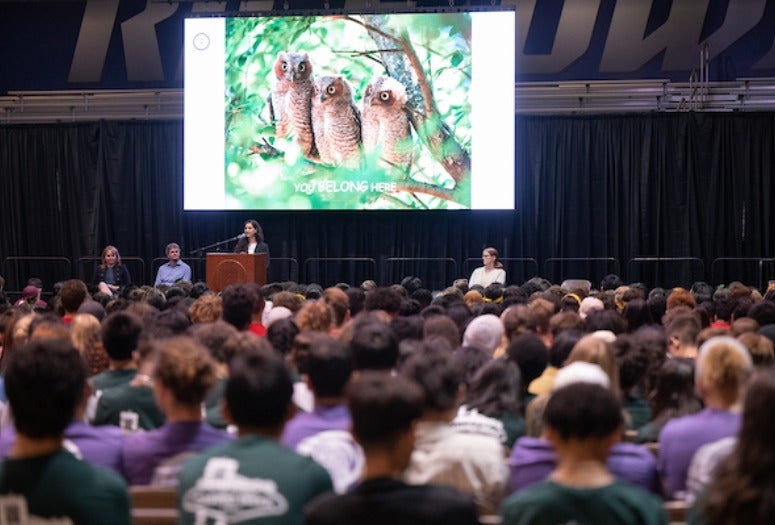On the second morning of O-Week, Rice’s incoming Class of 2026 gathered in Tudor Fieldhouse to hear a panel of professors share their secrets for success — both at Rice and beyond. Three faculty members from separate schools delivered short, TED-style talks encouraging freshmen to stay open to the possibilities the university offers.
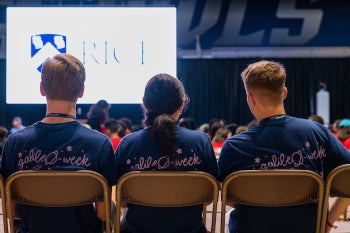
The address serves as a precursor to an academic fair as students embark on their academic journeys. One main priority is to acknowledge that the next four years will herald change and that the university is prepared to help students triumph along the way.
“This is a time-bound opportunity. Take advantage of opportunities, both inside and outside of the classroom … and there will be many opportunities outside the classroom,” Dean of Undergraduates Bridget Gorman said as she opened the Aug. 15 event. “You will not regret this investment of your time, and you are going to benefit in so many different ways.”
Gorman shared her own professional journey as an example: She’s a sociologist and demographer who studies health disparities, which was a career path she never envisioned as a freshman.
“When I was 18 years old, I had no idea I would be a sociology major. I had never even heard of it before I went to college. Quite frankly, it was a random class I took in my sophomore year that sparked an interest,” Gorman said. “Now, I have a deeply satisfying career path which was not anywhere on my radar when I matriculated in college. So, keep your eyes open and be open to different experiences.”
Brown College senior Lingkun Guo introduced the first faculty speaker, Sylvia Dee, an assistant professor in the Department of Earth, Environment and Planetary Sciences and head of Rice’s Climate, Water and Energy Lab.
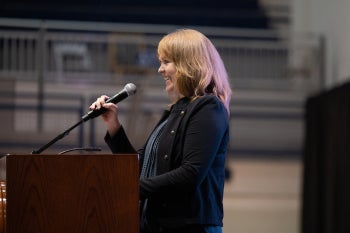
Dee detailed her research into Earth’s many human-made problems — increased global warming causing more frequent hurricanes, more intense flooding, more severe droughts — and made a call to address these problems. She recalled falling in love with her first Earth science class and how she discovered her passion for understanding both its beauty and chaos. Likewise, she challenged the freshmen class to seek out classes that inspire purpose.
“Use your education for good and in service to others,” she said. Praising the incoming class’ diverse interests and skill sets, she mentioned the problems facing the 21st century will require an all-hands-on-deck approach. “Your creativity and talent are what give me incredible hope,” she said.
Dee also charged students to look beyond grades when assessing their academic trajectory.
“I know you have come up through an academic system that has trained you to care deeply about your grades. I received my worst grade in college in the subject I now practice professionally,” she said. “I encourage you to focus on finding what you’re passionate about. The class you find most challenging will guide you, likely by exposing you to what you really want to do.”
As a personal note to the new Owls, she said, “My biggest piece of advice as you start your freshman year is this: Don’t see your classmates as competitors but as teammates. Work together. Help each other.”
Jones College senior Harry Golen presented Jonathan Homola, assistant professor in the Department of Political Science. He is a comparativist and a political methodologist who studies representation and electoral preferences.
Homola briefly summarized two research projects he recently conducted to give listeners a taste of the topics they might explore in the humanities. But the crux of his speech focused on lessons learned during his own college years that have impacted his life, including exploring the surroundings and having fun.
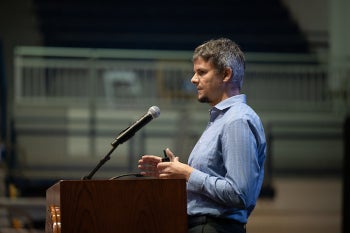
“Study and work hard. Obviously, that’s really important. I think it's equally important to also realize that this is an exciting time,” he said. “There’s a lot happening on campus to do in addition to studying. There's even more going on when you leave campus: concerts, theaters, sports … there's a lot to explore.”
He recalled joining the basketball team during his college years, which led to lifelong friendships. The team’s picture displayed on the overhead screen featured a 20-something Homola along with his teammates-turned-lifelong buddies.
“Those people here in the picture, one of these is my best friend. He was the best man at my wedding. I wouldn't have met any of these people if I had only taken my classes and only studied. You should be doing all of that, of course, but also make sure that in your college experience you have some fun,” he said.
McMurtry College junior Vidal Saenz welcomed Renata Ramos, associate dean for academic affairs for the George R. Brown School of Engineering and an associate teaching professor in the Department of Bioengineering.
Ramos took a different approach to addressing the crowd. Instead of reviewing her own work or achievements, she cut directly to tips for thriving in college. Her list began with embracing new experiences and appreciating the value of growing — if even by momentarily failing in the process.
“I know you've gotten here based on your many successes. Let's take a second to remember what those successes meant and how many times you failed before you got here,” she said. “You fell down many times when you were starting to walk, even if you don't remember. When you were trying to join a team or a sport, you kicked, threw or caught a ball 1 million times before you were good at it. ‘F.A.I.L.’ means ‘first attempt in learning.’ Failure is nothing but an opportunity to learn.”
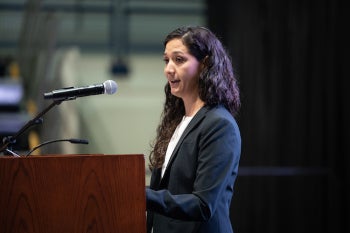
Ramos also espoused the importance of talking to faculty and nurturing a network, since both habits will pay dividends later in life.
“I’m going to let you in on a little secret, and it is called office hours. This is time that the faculty sets aside, opens their doors and waits for you. These people will end up giving you advice about your academic plans, internships and career. They’ll write your recommendation letters down the line,” she said. “(Beyond that,) students who have a strong network and support system will be more successful when they graduate, so go to events in your departments and make it a point to network with other students, faculty and alumni.”
Ramos finished the address with a rousing rallying cry: “Learn as much you can while you’re here, don’t be scared to fail, and build a network. You worked so hard to get here, and you belong here. Make sure you have fun, and make the best out of the next four years.”

